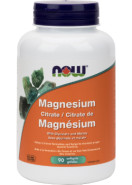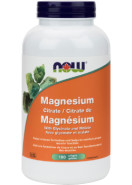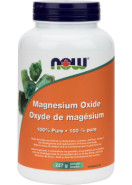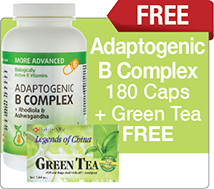Magnesium
Why Choose Magnesium For Heart Health?
Magnesium is a crucial mineral that plays a fundamental role in maintaining the proper functioning of the human body, including heart health. This nutrient is naturally abundant in a variety of foods, including green leafy vegetables such as spinach and kale, as well as in nuts and seeds, with almonds and pumpkin seeds being particularly rich sources. Read more >-
 MAGNESIUM CITRATE FROM NOW FOODS Magnesium is a mineral that is critical for energy production and metabolism, muscle contraction, nerve impulse transmission, and bone mineralization. It is a required cofactor for an estimated 300 enzymes. Among the reactions catalyzed by these enzymes are fatty acid synthesis, protein synthesis, and ...MAGNESIUM CITRATE FROM NOW FOODS Magnesium is a mineral that is critical for energy production and metabolism, muscle contraction, nerve impulse transmission, and bone mineralization. It is a required cofactor for an estimated 300 enzymes. Among the reactions catalyzed by these enzymes are fatty acid synthesis, protein synthesis, and glucose metabolism. Magnesium status is also important for regulation of calcium balance through its effects on the parathyroid gland. Magnesium Citrate is easily absorbed, and NOW Magnesium Citrate Softgels are provided in a liquid base with chelated forms for superior bioavailability. [SOFTGEL]+ Earn 10 Reward Points
MAGNESIUM CITRATE FROM NOW FOODS Magnesium is a mineral that is critical for energy production and metabolism, muscle contraction, nerve impulse transmission, and bone mineralization. It is a required cofactor for an estimated 300 enzymes. Among the reactions catalyzed by these enzymes are fatty acid synthesis, protein synthesis, and ...MAGNESIUM CITRATE FROM NOW FOODS Magnesium is a mineral that is critical for energy production and metabolism, muscle contraction, nerve impulse transmission, and bone mineralization. It is a required cofactor for an estimated 300 enzymes. Among the reactions catalyzed by these enzymes are fatty acid synthesis, protein synthesis, and glucose metabolism. Magnesium status is also important for regulation of calcium balance through its effects on the parathyroid gland. Magnesium Citrate is easily absorbed, and NOW Magnesium Citrate Softgels are provided in a liquid base with chelated forms for superior bioavailability. [SOFTGEL]+ Earn 10 Reward PointsSale: $10.99
Reg.: $17.99 (Save $7.00)
In Stock -
 MAGNESIUM CITRATE FROM NOW FOODS Magnesium is a mineral that is critical for energy production and metabolism, muscle contraction, nerve impulse transmission, and bone mineralization. It is a required cofactor for an estimated 300 enzymes. Among the reactions catalyzed by these enzymes are fatty acid synthesis, protein synthesis, and ...MAGNESIUM CITRATE FROM NOW FOODS Magnesium is a mineral that is critical for energy production and metabolism, muscle contraction, nerve impulse transmission, and bone mineralization. It is a required cofactor for an estimated 300 enzymes. Among the reactions catalyzed by these enzymes are fatty acid synthesis, protein synthesis, and glucose metabolism. Magnesium status is also important for regulation of calcium balance through its effects on the parathyroid gland. Magnesium Citrate is easily absorbed, and NOW Magnesium Citrate Softgels are provided in a liquid base with chelated forms for superior bioavailability. 180 SOFTGEL LARGER, MONEY SAVING BOTTLE!!![SOFTGEL]+ Earn 19 Reward Points
MAGNESIUM CITRATE FROM NOW FOODS Magnesium is a mineral that is critical for energy production and metabolism, muscle contraction, nerve impulse transmission, and bone mineralization. It is a required cofactor for an estimated 300 enzymes. Among the reactions catalyzed by these enzymes are fatty acid synthesis, protein synthesis, and ...MAGNESIUM CITRATE FROM NOW FOODS Magnesium is a mineral that is critical for energy production and metabolism, muscle contraction, nerve impulse transmission, and bone mineralization. It is a required cofactor for an estimated 300 enzymes. Among the reactions catalyzed by these enzymes are fatty acid synthesis, protein synthesis, and glucose metabolism. Magnesium status is also important for regulation of calcium balance through its effects on the parathyroid gland. Magnesium Citrate is easily absorbed, and NOW Magnesium Citrate Softgels are provided in a liquid base with chelated forms for superior bioavailability. 180 SOFTGEL LARGER, MONEY SAVING BOTTLE!!![SOFTGEL]+ Earn 19 Reward PointsSale: $19.99
Reg.: $24.99 (Save $5.00)
In Stock -
 MAGNESIUM OXIDE POWDER FROM NOW FOODS. Magnesium Oxide is derived from ancient oceanic deposits and is a rich source of elemental magnesium (58% average). Magnesium is an essential mineral that plays a key role in the activation of amino acids for protein biosynthesis and is highly concentrated in intracellular fluid and bone.[POWDER]MAGNESIUM OXIDE POWDER FROM NOW FOODS. Magnesium Oxide is derived from ancient oceanic deposits and is a rich source of elemental magnesium (58% average). Magnesium is an essential mineral that plays a key role in the activation of amino acids for protein biosynthesis and is highly concentrated in intracellular fluid and bone.[POWDER]+ Earn 13 Reward Points
MAGNESIUM OXIDE POWDER FROM NOW FOODS. Magnesium Oxide is derived from ancient oceanic deposits and is a rich source of elemental magnesium (58% average). Magnesium is an essential mineral that plays a key role in the activation of amino acids for protein biosynthesis and is highly concentrated in intracellular fluid and bone.[POWDER]MAGNESIUM OXIDE POWDER FROM NOW FOODS. Magnesium Oxide is derived from ancient oceanic deposits and is a rich source of elemental magnesium (58% average). Magnesium is an essential mineral that plays a key role in the activation of amino acids for protein biosynthesis and is highly concentrated in intracellular fluid and bone.[POWDER]+ Earn 13 Reward PointsSale: $13.99
Reg.: $19.99 (Save $6.00)
In Stock
Magnesium For Heart Health
Magnesium is a crucial mineral that plays a fundamental role in maintaining the proper functioning of the human body, including heart health. This nutrient is naturally abundant in a variety of foods, including green leafy vegetables such as spinach and kale, as well as in nuts and seeds, with almonds and pumpkin seeds being particularly rich sources. Whole grains like brown rice and oats also contain significant amounts of Magnesium. Additionally, legumes like black beans and lentils and some types of fish, such as mackerel and salmon, are good dietary sources of magnesium.
Unfortunately, modern agricultural practices have significantly depleted our soil, resulting in a much-reduced nutrient content in our foods, including magnesium. This is why magnesium is among the top four most prevalent nutritional deficiencies today.
Fortunately, magnesium supplements are readily available in health food stores and through online supplement retailers and can help everyone meet their dietary needs. Magnesium supplements are typically derived from compounds like magnesium oxide, magnesium citrate, or magnesium chloride and come in a range of delivery formats, including capsules, tablets, chewables, liquids, and powders.
Top Health Benefits of Magnesium
- Blood Pressure Management – Magnesium helps relax blood vessels, which helps lower blood pressure. It also regulates the balance of other minerals like potassium and calcium in the body, which are crucial for blood pressure regulation.
- Heart Health – Adequate magnesium intake is associated with good heart health and a reduced risk of heart disease. It also supports a healthy heartbeat by maintaining the electrical impulses that control it.
- Muscle Function – Magnesium is essential for proper muscle function, including that of the heart muscle. Moreover, it helps prevent muscle cramps and spasms.
- Bone Health – Magnesium plays a role in bone formation and density, contributing to strong and healthy bones.
- Nervous System Function – Magnesium is crucial for nerve function, helping to transmit signals between the brain and body.
- Energy Production – Magnesium is a co-factor in the production of ATP (adenosine triphosphate), the body's primary energy currency.
- Blood Sugar Control – Magnesium helps regulate insulin sensitivity and glucose metabolism, reducing the risk of type 2 diabetes.
- Stress Reduction – Magnesium helps mitigate the effects of stress by regulating the body's stress-response system.
- Improved Sleep – As the body’s relaxation mineral, magnesium improves sleep quality by promoting relaxation and reducing insomnia.
Magnesium Supplement Varieties
Given that magnesium deficiency is so prevalent, it should come as no surprise that supplements are so widely available for all different health concerns like sports recovery to heart health. These supplements are offered in a range of different forms, each with unique characteristics and benefits.
- Magnesium citrate - is one of the most commonly used forms due to its excellent absorption rate, which effectively alleviates magnesium deficiency and promotes overall health.
- Magnesium oxide - contains a higher percentage of elemental magnesium, but its absorption rate is lower, making it a suitable option for individuals with constipation issues.
- Magnesium glycinate - is prized for its gentle, highly absorbable nature, making it an ideal choice for those with sensitive digestive systems.
- Magnesium sulphate - found in Epsom salts, is mainly used for topical applications and therapeutic baths.
- Magnesium threonate - taurate, and orotate each target specific health concerns such as brain function and cardiovascular health.
Selecting the right magnesium form depends on individual needs and preferences. If you aren’t sure which magnesium is best for you, speak to the knowledgeable staff at your favourite health food store.
Buying Quality Magnesium Supplements
Magnesium supplements are exceptionally well tolerated. Occasionally, they can cause mild side effects such as diarrhea, nausea, and stomach cramps, especially when taken in large doses. Additionally, magnesium can interact with certain medications, such as antibiotics, diuretics, and medicines used to manage heart conditions or osteoporosis. These interactions can affect the absorption or effectiveness of both the magnesium supplement and the medication. If you are taking prescription medications, speak to your healthcare provider before starting to supplement with magnesium.
Back to Top ↑





















